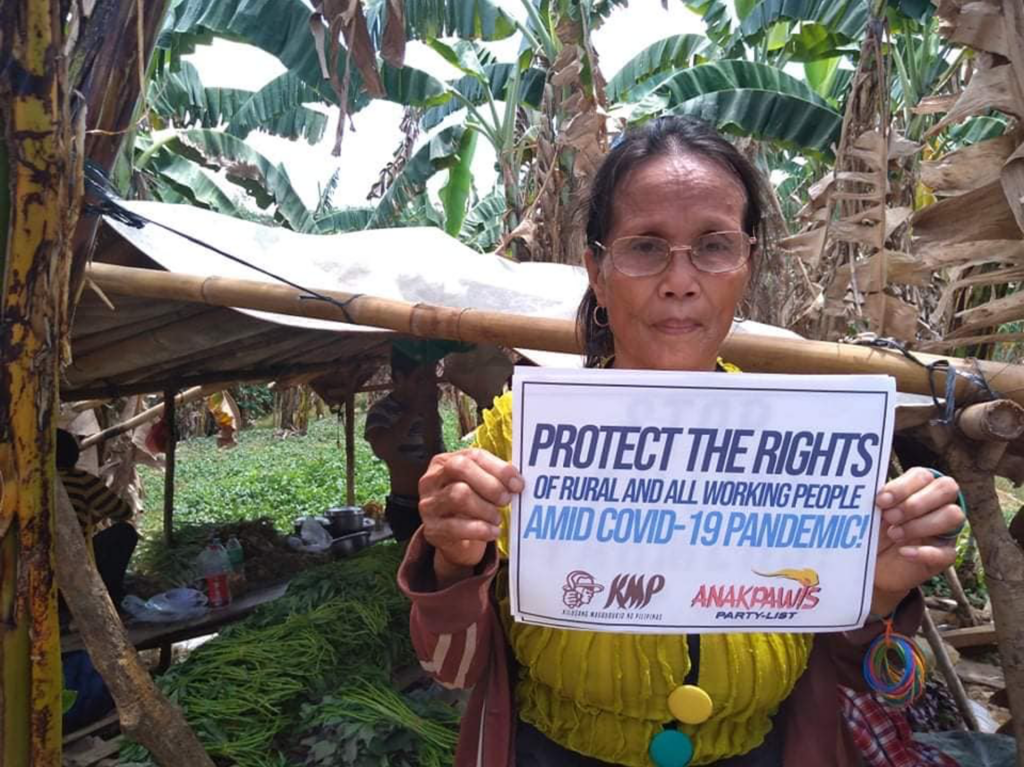The Agroecology Fund recently collaborated with A Growing Culture on five episodes of their Hunger For Justice Series. Launched to highlight the inequities of the industrial food system exposed by Covid-19, these weekly live broadcasts featured agroecology leaders from the AEF grantee network, and sought to amplify their grassroots community-led solutions for resilience.
“The series is a chance to pull people with an environmental focus into the social aspect of the food movement. A lot of the people tuning in are familiar with regenerative agriculture and sustainability but not food sovereignty and agroecology,” says A Growing Culture’s Loren Cardeli.

On July 24, the series featured AEF grantee partner Kilusang Magbubukid ng Pilipinas, the Peasant Movement of the Philippines, KMP. KMP is a democratic mass organization of more than 2 million Filipino peasants fighting for land reform, social justice and social change. KMP chairman emeritus Rafael ‘Ka Paeng’ Mariano and project coordinator Kathryn Manga were in conversation with journalist Nancy Matsumoto.


In the Philippines, fewer than 7 out of 10 farmers own the land they farm on. Impoverished by high land rents, they are often driven to debt and hunger. Research from the FAO shows that even prior to the Covid-19 pandemic, the number of Filipinos who went hungry increased by 31%. There were 44.9 million hungry Filipinos from 2014 to 2016; from 2017-2019, this number grew to 59 million. Farmers and consumers alike have been impacted by agricultural trade liberalization and high food prices, and policies that do not support local production.
For the past 35 years, KMP has advocated for the redistribution of land to landless peasants. The organization fights for peasant rights and an end to agrarian injustices such as land-grabbing and displacement.

“We want Filipino peasants to attain food sovereignty and food security. The land belongs to the farmers, not landowners who don’t know how to till the land,” said Rafael Mariano, chairman of KMP.
Peasants’ demands for access to land and the right to farm it are increasingly met with violence. Since the election of President Rodrigo Duterte in 2016, harassment and killings of farmer peasant leaders has increased: 262 farmers have lost their lives in connection to land disputes since Duterte’s election. In August this year, 62 human rights and civil society groups sent a letter to UN member and observer countries at the Human Rights Council to express their “continued grave concern over ongoing extrajudicial executions and other serious human rights violations” in the Philippines.
Yet, despite the disappearances and killings of several activists and leaders, KMP continues to defend peasants’ rights to secure and dignified livelihoods.
“Farmers must be united to overcome issues”
The farmers of KMP strive to feed their families and communities by practicing agroecology on collectively cultivated areas known as Bungkalan. These shared tracts of land engender solidarity between rural families, participatory decision-making, and farmer-to farmer-learning. “These values of solidarity and reciprocity used to define agrarian communities well before the Green Revolution, said Mariano. In the Philippines, this is known as “bayanihan”.
During the early stages of the Covid-19 lockdown, the produce from these collective farms helped feed and support thousands of vulnerable people. With public transport temporarily disabled and markets shuttered, farmers were not able to tend to their fields or sell their produce, and fisherpeople who could not go out to fish.
“For farmers, there is no such thing as work from home. If they can’t farm, they will have nothing to eat,” said Kathryn Manga.
The organization displayed remarkable agility in responding to the crisis. They launched a completely volunteer-driven online Bagsakan, or farmers’ market, so that consumers in urban centers could be supplied with fresh, healthy produce grown on their collective farms. In Bicol and the island of Mindoro, they worked with the local government so that local agricultural produce was distributed as relief rations, instead of imported canned goods, explained project officer Kathryn Manga.
The funds they were able to raise went towards relief operations for landless and displaced farmers. With support from the Agroecology Fund, KMP is also helping people set up backyard gardens and kitchen gardens, and helping farmers preserve their produce to build resilience and ensure food security in times of crisis.
“We need to value people’s interests over corporate interests,” said Rafael Mariano. He and the millions of peasant activists in KMP will continue to fight for social justice and development that upholds the rights of those who grow food for their fellow Filipinos. As Kathryn Manga put it, their fight is for a future where farmers are happy and share a connection to the land, where they are recognized and respected for their hard work, and can lead a dignified life.
Watch the full recording on YouTube:
Learn more about AEF’s Emergency Fund grantees here.
Photographs courtesy KMP.
